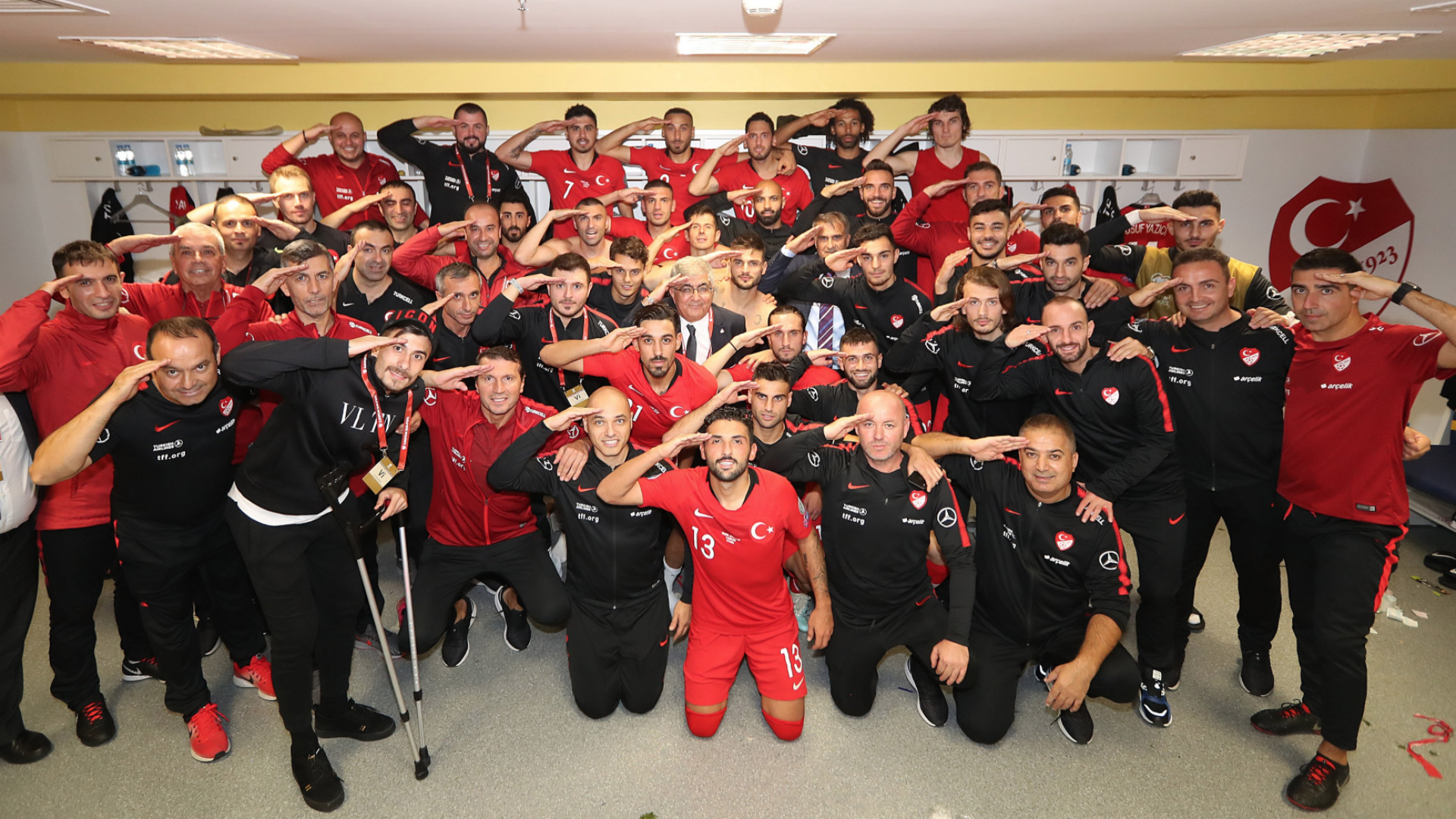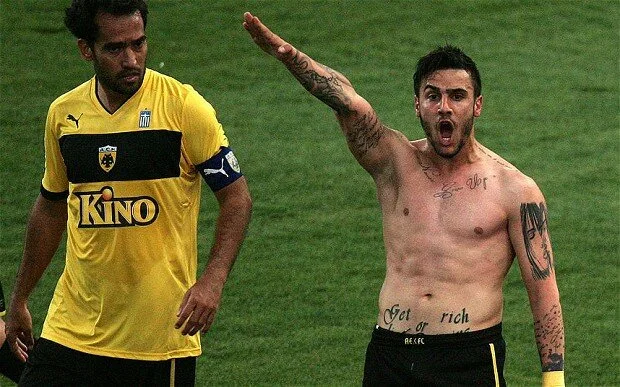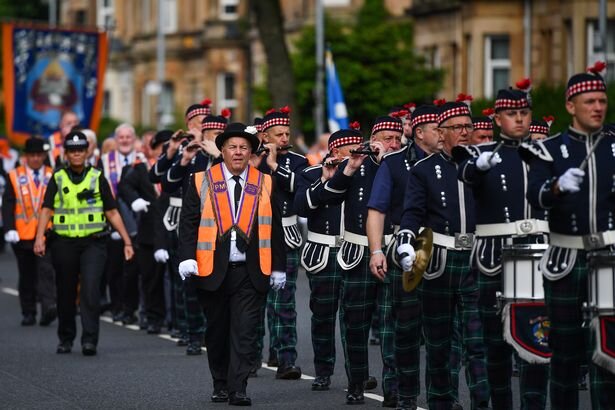Politics in Football | When Players Get Involved
According to ‘Article 16 Order and Security at UEFA Competition Matches’ of UEFA’s own regulations, they prohibit; “the use of gestures, words, objects, or any other means to transmit a provocative message that is not fit for a sports event, particularly provocative messages that are of political, ideological, religious or offensive nature”.
So the message from Europe’s governing body is clear; no politics allowed in football. How hard is it to police and implement this? About as difficult as stopping the tide.
Politics has and always will find its way into football somehow. Usually it comes from the stands, but sometimes the players take it upon themselves to send political messages and this is what we are going to look at today.
This list is not in any particular order and the placement of one action before another doesn’t make it any more or less offensive, provocative, well-known, etc. There are also countless other examples we could have used, these are just six examples that grabbed a lot of media attention and cover quite a broad-spectrum of political and societal issues.
Paolo Di Canio Salute
It was January of 2005 and Lazio has just beaten Roma 3-1 in the “Derby della Capitale”. The Lazio players were leaving the pitch having shown their appreciation to their beloved Curva Nord, when Paolo Di Canio saluted the Curva in a very deliberate and particular manner; arm straight out, palm down, around head height.
Di Canio explained in a post-match interview that “the salute is aimed at my people” and when questioned about whether the salute had Nazi or racist meaning behind it, he replied; “I am a fascist, not a racist”.
This was not the first time Di Canio had done such a salute during his time at Lazio and this time the Italian FA dished him out a one-game ban and a €7000 fine.
The debate rumbled on following Di Canio’s actions, as to whether the salute was Nazi, racist, fascist, Roman, or otherwise, but what is clear is that Di Canio is a very proud Roman who has never hid his admiration for Italy’s former leader Benito Mussolini.
In 2016 Di Canio was fired from Sky Italia after an appearance on live television where a tattoo on his bicep was clearly visible. The tattoo read; “DUX” the Latin word for “leader”. It was Di Canio’s way of paying homage to the man known as “Il Duce” to Italians during his time in power.
To confuse matters even more, when appointed Sunderland FC manager in 2013 Di Canio was quizzed by the media about the 2005 salute and his political affiliations and he this time replied; “I am not political. I am not a racist or a fascist”.
A divisive character most definitely, but the exact meaning behind this particular salute? You’ll have to draw your own conclusions there.
Nicolas Anelka - Quenelle Gesture
Nicolas Anelka scored in a 3-3 draw for West Brom versus West Ham in December of 2013 and upon scoring did a strange thing with his two arms; pointing one towards the ground, palm down, with the other hand covering his bicep. Nobody on the pitch, in the stands or in the English media initially picked up on what had just happened but once pictures surfaced online, there was uproar in back in his native France.
Anelka had allegedly carried-out a “Quenelle” salute. The Quenelle was made famous by Anelka’s friend and controversial French comedian Dieudonne M’Balla M’Balla. M’Balla was known to have included a lot of anti-semetic material in his comedy and in 2009 he had actually run for European elections for an anti-Zionist party.
The image spread around the world and Anelka was labelled as “racist” as many saw the Quenelle as an inverted Nazi salute, he was labelled an anti-semite for his affiliation with M’Balla and French Minister for Sport Valerie Fourneyron called Anelka’s act “disgusting”.
At the time Anelka insisted the gesture was “anti-establishment” and was not anti-semetic. Following the uproar the FA investigated and eventually Anelka was hit with a five-game ban and a fine of £80,000. That essentially was the issue put to bed.
However in 2020 Netflix released a documentary about the career of Anelka called; “Anelka: Misunderstood”. In it he addresses the Quenelle and this time he clearly lays out that the meaning behind the gesture was aimed at one individual and one individual only.
Steve Clarke had just been sacked as West Brom manager and in the games leading up to the 3-3 draw with West Ham, Clarke had left Anelka on the bench or substituted him while West Brom were drawing or behind in a game. Anelka insisted that the goalscoring gesture was meant as an “up yours” to Clarke, seeing as the word “quenelle” in French slang can also mean “finger” or “penis”.
Again, there is a little aspect here of making up your own mind as to what Anelka actually meant by the gesture and what his real intentions behind it were.
Turkey Military Salute
In October of 2019 Turkey came away with an impressive four points from a Euro 2020 qualification double-header; a win at home to Albania followed by a draw in Paris. However the results and performances were all but forgotten following the actions of the Turkish squad after both games.
The fixtures coincided with a Turkish incursion against Kurdish forces along the Turkey-Syria border, known as Operation Peace Spring. There was international condemnation of the attacks, but the Turkish football team saw the political situation differently and used, particularly the high-profile French game, to show their support for the Turkish troops.
The squad was pictured doing a military-style salute after a goal versus Albania and then again in Paris versus France.
The official Turkish FA Twitter account also posted a photo of the entire squad doing the salute in the dressing room following the Albania win, dedicating the win to; “our brave soldiers and fellow martyrs”.
The Turkish team & backroom staff following the home win versus Albania | Photo Credit
The French FA called for sanctions against Turkey for a clear breach of UEFA protocol and in December 2019 the Turkish FA were fined €50,000 for the action of its players.
The action and what it was in reference to was clear as day in this instance.
Grant Xhaka & Xherdan Shaqiri Albanian Eagle
Open to debate, but arguably still the most politically sensitive issues in Europe are centered around the borders and the recognition (or lack thereof) of the independent nations in the Balkan region, in particular involving; Serbia, Albania, Kosovo and Croatia.
Football has been dragged into the political tensions on a number of occasions, most notably with the “drone Albanian flag” incident during a Serbia-Albania game in 2014 and then again in the 2018 World Cup, which is what we’ll look at now.
Switzerland had just beaten Serbia 2-1 in a group-stage game of the 2018 World Cup in Russia., thanks to an injury-time winner. Switzerland’s two goalscorers? Granit Xhaka and Xherdan Shaqiri. The significance? Both are ethnically Kosovar-Albanians who fled to Switzerland as refugees in the 1990s to escape the war with Serbia. The controversy? Both players celebrated their goals by mimicking the two-headed eagle from the Albanian flag to the fans in the stadium and the millions watching around the world.
Even if you were to take the goal celebrations out of the equation, the political influence on this game between two nations with no significant shared history, was clear for all to see.
Serbia fans loudly booed and jeered Xhaka and Shaqiri anytime they touched the ball, there were some Albanian flags clearly visible in the Swiss end of the ground and pictures also emerged after the game that one of Shaqiri’s boots had been sporting a Kosovan flag on the heel.
The flag of Kosovo clearly visible on Shaqiri’s right boot | Photo Credit
The political fallout online after the game was massive, with major political players who were both pleased and appalled with Xhaka and Shaqiri’s actions weighing in on the debate.
In a Tweet, Kosovan President Hashim Thaci congratulated Switzerland on their win and said he was proud of them, naming Xhaka and Shaqiri specifically.
The Albanian Prime Minister posted a photo to his Facebook page of both players’ eagle celebration with the caption; “PHOTO OF THE DAY”.
While in Serbia there was outrage and anger calling the celebrations “brutal provocation” that has “infuriated all Serbs”. While the Serbian FA were outraged at the non-awarding of a clear penalty during the game and made an official complaint about the goal celebrations, the Kosovo flag on Shaqiri’s boot and the presence of Albanian flags at the stadium.
Upon review, FIFA gave Shaqiri and Xhaka a fine of 10,000 swiss francs each, but more importantly no bans were handed down freeing both to continue to play at the tournament.
Again in this instance the political action and its meaning were crystal clear. Given that it was done on football’s biggest stage, the nature of Shaqiri’s 90th minute winner and the fact that the fines handed out to both players would only have been a fraction of their weekly wage, one couldn’t help but think that there was a more satisfactory outcome for Xhaka and Shaqiri in all of it.
Giorgos Katidis Salute
Does the name Giorgos Katidis sound familiar? Most likely not.
In March 2013 Katidis was 20 years-old and had just scored the winner to help AEK Athens beat Veria FC 2-1 in the Greek Super League. He ran off to the corner flag, took his jersey off in jubilation and just before being mobbed by his teammates he clearly seemed to imitate a Nazi salute towards the crowd.
Katidis had captained Greece at under-19 level and had also been capped at under-21 level. However his days playing any form of international football were done.
The Greek FA immediately released a statement condemning Katidis’ actions and announcing he would not be considered to represent his country ever again, at any level.
Katidis’ defence was one of innocence. He claimed; not to know what the salute meant, that he was pointing to a teammate in the crowd, that he is not a racist or a fascist and was extremely sorry for any hurt or offence caused. Surprisingly, he also received support from AEK’s German manager Ewald Linen, who claimed; “He is a young kid who does not have any political ideas”.
AEK’s fans, in particular their ultras group “Original 21”, are quite politically left-wing in nature and many anti-Nazi and ANTIFA displays have been seen inside the Olympic Stadium in Athens. So predictably there was fan outrage and pressure on AEK to act swiftly and decisively. Eventually fan pressure won-out as Katidis was suspended for the remainder of the season. He eventually had his contract terminated by AEK.
An example of the kind of banner regualrly displayed by AEK fans | Photo Credit
He joined Italian side Novara Calcio that summer and his career never seemed to recover from the incident. He had spells at clubs in Italy, back in Greece, Finland and the Czech Republic and has been without a club since July of 2019.
One moment of madness, politically intentional or not, totally ruined a promising young career.
Paul Gascoigne’s Orange Order Flute
Derby day in Glasgow rivals any derby on the planet in terms of pure hatred and passion between Celtic and Rangers, both on and off the pitch. The political situation in Northern Ireland and the period of its history known as “The Troubles” spilled over into Scotland and added extra venom and hate to the derby throughout the 1960s, 70s, 80s and 90s.
The fixture is always a fiery occasion with no added incentive needed for the players or crowd to be up for the game. However in a 1998 Celtic-Rangers game at Celtic Park, Rangers striker Paul Gascoigne added fuel to an already roaring fire.
The 1997/1998 season had the usual connotations of Glasgow’s two big clubs fighting it out for the title, but this year was particularly special as Rangers had won nine league titles in a row, equalling a record for consecutive titles set by Celtic from the late 1960s into the early 1970s. A league title success in 1997/1998 would deliver Rangers the much coveted ten-in-a-row, the ultimate domestic bragging rights between the two.
England striker Paul Gascoigne had been recruited by Rangers in 1995 to help try maintain their recent domestic dominance, as well as try help secure the ten-in-a-row and in a derby game in Celtic Park in 1998 he landed himself in hot water. He mimicked the playing of a flute, an action synonymous with the Orange Order, but particularly the Orange Order in Northern Ireland.
The July 12th marches across Northern Ireland are a point of contention between the Catholic and Protestant communities for decades and even still to this day. It is largely a Protestant, Unionist, Loyalist celebration of the victory of William of Orange at the Battle of the Boyne in 1690. The marches, which heavily feature flute bands, often marched through Catholic, Nationalist, Republican neighbourhoods, where the majority of residents did not want the march taking place in their area. Thus, often leading to violent confrontations between communities around what is known as “Marching Season”.
An example of a typical Orange Order march | Photo Credit
As expected, Gascoigne’s flute gesture did not go down well with Celtic fans. He was cited by the Scottish FA following the game and subsequently fined £40,000.
Gascoigne protested his innocence claiming; he was not fully aware of the gesture’s meaning, he had carried out a similar celebration previously and was not disciplined for it and some of his teammates had encouraged him to do it.
He also later revealed he received death threats from who he presumed were the IRA and had to increase his own private security for a time, not taking the threat all too lightly.
These are just some of the countless examples where football and politics have crossed paths. It has always happened. It is still hapening. It will always happen. So the main takeaway from all of this? Football and politics will never be apart.









